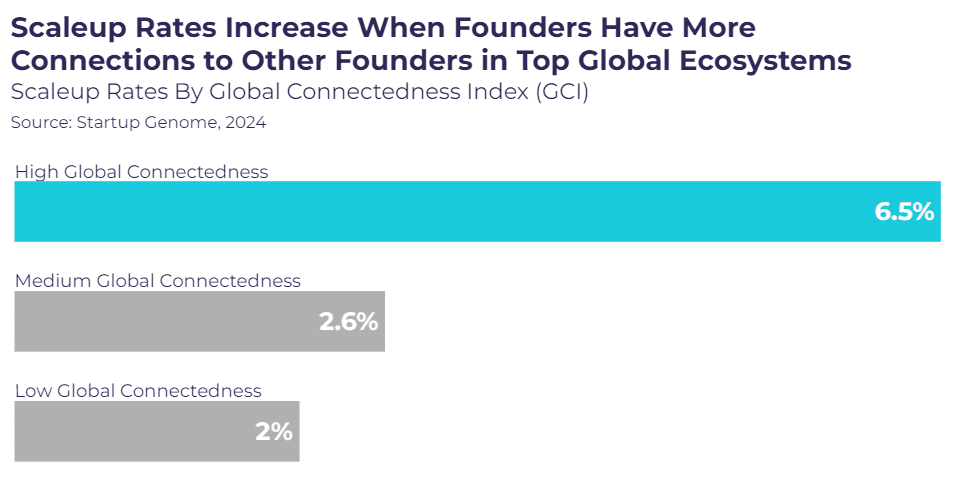The Ecosystem Needed for Startups to Flourish
Aug 13, 2024
Introduction
Startups are a driving force of innovation, job creation, and economic growth. For these new ventures to succeed, they require a robust ecosystem that fosters their development and scalability. However, there are important foundational elements needed to become an ecosystem hub. Access to funding is crucial for startups, enabling them to develop products, scale operations, and reach new markets. A concentration of potential investors—including venture capitalists, angel investors, and crowdfunding platforms is essential. Silicon Valley exemplifies this with its high concentration of venture capital firms.
Access to Funding
The UK has mirrored this approach, particularly in London, which boasts a burgeoning venture capital scene. Funds such as Index Ventures and Balderton Capital have been instrumental in financing UK-based startups. Additionally, government initiatives like the Enterprise Investment Scheme (EIS) and the Seed Enterprise Investment Scheme (SEIS) offer tax reliefs to investors, incentivizing early-stage investment. However, this is not all. Strategic initiatives that support fragile early stage ventures are required. To this end, organisations like Innovate UK provide funding to promising projects through various programmes, including Smart Grants.
For the top startup cities globally, ‘fundraising value’ and ‘fundraising count’ both correlate significantly with startup potential, allowing more startups to flourish in specific locations worldwide, like San Francisco, London, New York, LA, Beijing and Shanghai.
Talent Pool
A vibrant startup ecosystem requires a continuous input of skilled talent. Silicon Valley benefits immensely from its proximity to world-class universities such as Stanford and Berkeley which integrate a focus on the venture world into their curricula, which produces a steady stream of top-tier talent. Additionally, the region overall attracts global talent due to its reputation as the epicentre of tech innovation, as well as the state of California’s favourable climate, political stances and lifestyle opportunities to prospective employees. It is a much desired circular model.
The UK has followed this formula, leveraging its educational institutions, including as an example Oxford and Cambridge centres of innovation. Looking specifically at London, it takes advantage of the proximity to several universities (to name a few: Imperial College London, UCL and King’s College) with strong innovation labs to cultivate a highly skilled workforce . The diversity of London, with its international appeal, also draws talent from around the world. Moreover, government policies facilitating the increase of skilled immigration have been pivotal in maintaining a robust talent pipeline. Over the years UK, and London to a larger degree, benefitted from the positioning of the country as the digital and creative epicentre.
In Asia, Beijing and Shanghai’s cosmopolitan nature attracts talent both from across the country and globally. This not only includes working professionals, but also, university students who enrol at some of their leading institutions such as Tsinghua, Peking, and Shanghai Jiao Tong University.
Strategic Initiatives and Infrastructure
If we expand our view of what dictates favourable climates for startups beyond the factors mentioned above, we have to acknowledge the strategic initiatives of individual countries or states. These factors include the availability of physical workspace, including co-working offices/accelerators/incubators. Social proximity is a powerful and proven impetus to collaboration and innovation.
Policies that smooth worker relocations and overall integration into their new work environments. International connectivity through shared markets such as the EU. Strategic efforts to build a brand around locations that enhance brand equity, trust, and reinforce the public perception of innovation are key. The reputation of a location as innovative is definitely a boost to any ventures that are based there, drawing on the Hotelling’s Law, which demonstrates that clustering together allows for expanded shared benefit.
Inclusive growth policies like Zhanhjiang’s Hi-Tech Park in Shanghai, Silicon Valley’s prestigious incubators and accelerators, such as Y Combinator and Techstars and London Tech Hub and Manchester's Circle Square, offer modern, flexible workspaces and foster effective communities where startups can interact, collaborate, and share knowledge.
Venture firms and investors also prefer to support “clusters” of innovation for much the same reasons as startups themselves: easier recruitment of specialists, innovative ideas (borne in competitive landscapes), better funding and co-funding opportunities allowing to better risk manage, reputation, decreased cost of search for deals, as well as concentration of industry specific auxiliary services.
Future-proofing Strategies
It is incredibly important for startup ecosystems to be future-proof, to guarantee resilience in the face of economic downturn, law changes and other extraneous variables. One way to do this is to diversify funding sources. Encouraging alternative funding sources such as corporate venture arms, government grants, and crowdfunding can provide startups with more options and stability. Developing an array of financial instruments that de-risk investments in early-stage companies can also attract a broader range of investors.
Ensuring that the benefits of a thriving startup ecosystem are widely distributed is essential for long-term sustainability. This includes supporting underrepresented groups in tech, promoting gender diversity, and ensuring regional growth beyond major cities. Initiatives like mentorship programs, diversity-focused funding, and regional innovation grants can foster inclusive growth.
The rapid pace of technological advancement requires ecosystems to be adaptable. Continuous investment in emerging technologies such as artificial intelligence, biotechnology, and renewable energy can keep ecosystems at the forefront of innovation. As one of the most rapidly growing startup cities globally, Shenzhen is known as the hardware capital of the world, with unparalleled access to manufacturing resources. This empowers the city, allowing for rapid prototyping, enabling startups to quickly iterate on product designs and bring innovations to market significantly faster than in other locations.
Robust physical and digital infrastructure is crucial. This includes not only modern workspaces but also high-speed internet connectivity, reliable transportation networks, and affordable housing. Policymakers should prioritise urban planning and infrastructure development to support the needs of startups and their employees.
On the issue of the psychology of entrepreneurship there is the fundamental importance of fostering a culture of risk-taking, acceptance of failure, and entrepreneurial spirit to encourage innovation. Entrepreneurship needs a very special type of founder(s). Without individuals willing to think bigger and outside the box, startups will struggle to flourish, and innovation will be stifled.
Another important aspect of founders' success is their ability to build personal international networks and understand the mechanics of the broader world around them. This is demonstrated by a study done by Startup Genome which analysed the correlation between the breadth of international and diverse networks of the Founder and their ability to successfully scale their businesses globally. The correlation was vastly positive, which highlights the importance of personal international networks.

Case Studies
London: Resilience in the Face of Change
Coming back to the topic of ecosystem resilience we should look at the case of London.
This resilience is best showcased by London which retains its crown as the leading location for startups, behind only Silicon Valley, even in the wake of Brexit and the implications it had on business across the UK, including on importing / exporting and the migration of talent. As of 2022, London’s startup ecosystem was valued at $314B USD - well above rival ecosystem hubs such as Berlin at $94B USD and Paris at $89B USD. The city’s tech sector showed significant rebound following Brexit & the pandemic to maintain its title as the startup capital of Europe. Such buoyancy is attributed to its retained access to global talent, abundant access to funding and its connectedness to the world.
Shenzhen: The Hardware Capital
For emerging startup hubs, adopting these strategies present in London, Silicon Valley, Shanghai, Beijing and Shenzhen, can pave the way for long-term success. A resilient and adaptive ecosystem not only nurtures startups but also spills over into broader economic and societal benefits. As the global landscape continues to evolve, staying ahead requires a commitment to continuous improvement and innovation. By building on the lessons from successful regions and anticipating future challenges, we can create vibrant, sustainable ecosystems that drive the next wave of entrepreneurial success.
Conclusion
At Raw Ventures, we are becoming an integral part of the growing mediatech ecosystem in Potsdam, Germany. Recognising the interesting initiative in the country which is supported both in terms of capital and resources at the federal level, we have provided institutional VC injection, contributing towards an improvement in the quality of startups operating in that region. Our big hope and vision is that Potsdam will develop into a mediatech Silicon Valley of Europe and we welcome other ecosystem stakeholders to join us!
